The root cause of fatigue
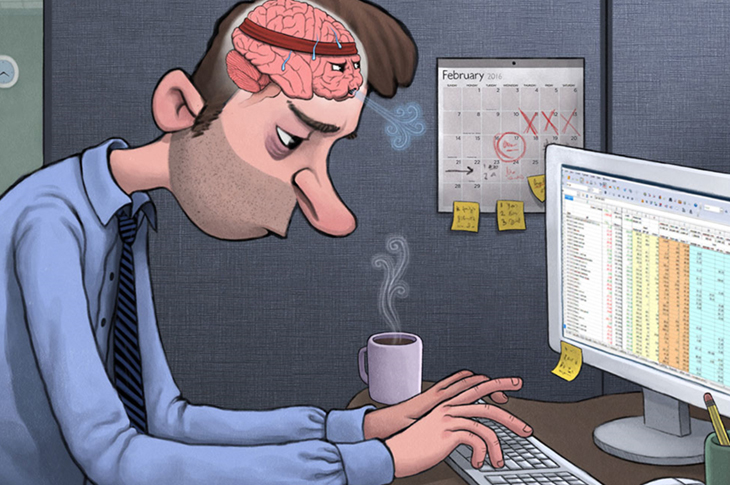
Many people are concerned about not recovering quickly from fatigue, even with long hours of sleep, lacking concentration, suffering from chronic fatigue, and losing interest due to stress from work and home.
According to the portal for national health, approximately 24% of all patients who visit the local hospital have visited the hospital for their fatigue. Out of these patients, 15~30% manifested consistent fatigue symptoms for more than a month, and about 10~20% reported that their fatigue symptom persisted for over six months.
Regardless of age and gender, anyone may feel fatigue symptoms; however, females have more than males, and 60 and over elders have more fatigue symptoms than young people. According to the statistics, out of all the patients claiming fatigue symptoms, less than 50% is because of their illnesses; aged 40 and over, patients are more tired because of their physical illnesses than less than age 40 patients. Compared to the past, patients complaining about their fatigue symptoms are ever increasing, and Chronic Fatigue Syndrome is also growing.
However, the problem is that the root cause of these fatigue symptoms is too complicated, so it is hard to resolve it.
A recent study has revealed that the cause of chronic fatigue is the protein fatigue factor. When this fatigue factor gets stored up, it results in chronic fatigue. It is not yet clear what this fatigue factor is. Meanwhile, in December 2018, Bonn Sigmund-Freud-Str University Hospital in Germany conducted a research and led them to one answer.
Fatigue factor occurs when the brain gets stressed and becomes chaotic, in which the autonomic nervous system loses its normal function. At normal state, the sympathetic nerve and a parasympathetic nerve activated during the rest act as a brake and acceleration based on the environment and the situations, contributing to its total body circulation and maintenance property. When this autonomic nerve balance breaks apart, this is related to the brain fatigue generation.
For example, long hours of computer monitoring would lead to tired eyes. In reality, the brain is the one experiencing the fatigue. Typically, when people look far away, their parasympathetic nerves get activated while their sympathetic nerves get activated when looking at something nearby. When people work on the computer, they continuously keep the tension by always looking at the screen nearby. The balance of the autonomic nerve system breaks, causing brain fatigue.
Therefore, the fatigued brain sends a signal that the eyes are tired and a signal to stop working on the computer. Memory differs significantly while not tired versus weary.
A tired brain cannot maintain memory well. Also, resistance to stress gets weakened. Thus, brain fatigue can substantially affect us;
however, there has been no apparent solution to this issue.
Disclaimer: This content consists of medical papers and academic information and is not intended to diagnose,
treat diseases, or replace a doctor's advice, and all outcomes may vary from person to person.

Many people feel like, “Tiredness doesn’t go away despite sleeping a lot,” or “I rested over the weekend, but my body feels heavy.”
The culture and environment of modern people are the backgrounds of fatigue. A smartphone is always held in hands; it is inevitable for the brain to accumulate stress due to too much information intake. Also, irregular living patterns, chronic lack of sleep, childcare, work, complicated relationships, and drinking lead to many stress types. Thus, stress is always accumulated in us. Working long hours without rest leads to decreased efficiency and increased mistakes.
According to the National Statistical Office’s index of state, Korea’s labor productivity level, compared to major OECD countries, is around 34.3 dollars, around half of the USA, France, and Germany, approximately 60 dollars (2017).
There is no other way to explain working most hours with cheap labor productivity other than chronic fatigue.
Disclaimer: Medical articles and academic information provided on this site are for educational purposes only and are not intended to diagnose, treat, or prevent any disease or to replace the advice of a physician. In addition, when the effects for a specific period, comparisons before and after product use, reviews of use, and end-of-life test results are specified, there may be different results for each user.
Tired? Your Brain is.
When you feel down, and fatigue all the time
even after you rest and sleep, you should consider
these following factors:
-
Respiratory issue due to long hours of wearing a mask
-
Intensive muscle work due to extensive exercising, restless work, physical labor
-
Psychological fatigue from the stress and the environment
-
Fatigue from lack of oxygen in the brain and deficient nutrient in the body
-
Fatigue as a symptom of the diseases
When there are any changes to the body temperature, blood pressure, oxygen concentration level
in the blood and other factors, the body orders the tissues to stop the excessive activity in order
to balance the autonomic nervous system.
Most of the stroke patients feel fatigue all the time because of this. When the body conditions change due to above mentioned factors,
the brain actively works to order a command to stop the body from overly working, so many people live with the chronic fatigue.
Disclaimer: Medical articles and academic information provided on this site are for educational purposes only and are not intended to diagnose, treat, or prevent any disease or to replace the advice of a physician. In addition, when the effects for a specific period, comparisons before and after product use, reviews of use, and end-of-life test results are specified, there may be different results for each user.
Incurable Fatigue, “Chronic Fatigue” Calls on Death

Recently, the number of people suffering from chronic fatigue is skyrocketing. Fatigue is classified into three types classified by the duration: fatigue that recovers after one day is “acute fatigue,” fatigue that lasts for about a week is “subacute fatigue,” and fatigue that lasts for six months or more is “chronic fatigue.”
Fatigue continues because you can’t rest your body, mind, and sleep properly. At night, the body prepares for sleep by increasing parasympathetic activity instead of sympathetic activity. Still, when brain fatigue is accumulated, the body and mind are at their excited state, and the sympathetic activity is maintained high, making it difficult to sleep.
Therefore, many people have insomnia and cannot sleep, even though they are tired.
If the chronic fatigue persists, the risk of cardiovascular diseases such as high blood pressure, angina, myocardial infarction, and digestive disorders, including stomach and duodenal ulcers, increases; the immunity weakens become much susceptible to infectious diseases such as cold and influenza.
Some people say they are strong-willed, stress-free, and don’t get tired. However, these people should not be too careless.
For example, people optimistic about their work may not look exhausted on the outside. Here, you’re tired, but you don’t feel tired because you’re in a state of high motivation and excitement. If you work with enthusiasm, you will get results of self-satisfaction, and if your brain is activated, dopamine, which brings pleasure, will be released. Dopamine also has the effect of suppressing pain, so if it is secreted in large quantities, you will no longer feel “fatigue.”
If you know such a person at work, suspect that this person may have hidden fatigue that one is not fully aware of.
If you don’t feel tired, you consciously do not fully rest, resulting in continuously straining your body. People who work hard often collapse suddenly without notice because of the damage caused by hidden fatigue explodes.

Disclaimer: Medical articles and academic information provided on this site are for educational purposes only and are not intended to diagnose, treat, or prevent any disease or to replace the advice of a physician. In addition, when the effects for a specific period, comparisons before and after product use, reviews of use, and end-of-life test results are specified, there may be different results for each user.
Brain Fatigue and Decline in Body Function
-

Concentration
Through experience, everyone knows that concentration and brain fatigue are inversely correlated. Contrary to this, the efficiency of working or studying is proportional to concentration. Many people blame themselves, saying, “I have a terrible attention span…” but humans innately avoid concentration for survival.
Concentrating on one thing delays noticing dangerous animals or cars approaching from a blind spot. To prepare for sudden danger, we must simultaneously process and respond to different information given.
Thus, the brain has adapted and evolved to disperse attention into different things simultaneously naturally. Therefore, to concentrate on work or studying, the brain must block unnecessary information and only process necessary information, an activity against its natural state; hence, the brain feels tired after concentrating. Therefore, it is difficult for humans to focus on one task and simultaneously perform other tasks. Each part of the brain must be evenly activated. Still, after concentrating for an extended period and only activating certain aspects, this destroys the balance, and the brain gets quickly tired.
-
Memory
To acquire tasks, we must establish the obtained information into memory. There is “short-term” memory and a “long-term” memory. When something gets memorized, it is first stored in the hippocampus as “short-term” memory. The short-term memory only lasts for a couple of seconds, and around seven memories are maintained.
After that, once material that is determined to be kept for a long time, it is sent and preserved in the cerebral neocortex's temporal lobe. The hippocampus stores short-term memory and distinguishes whether the information needs to be sent in the long-term or not. However, when the brain gets tired, the function of the hippocampus weakens. Then. It cannot transform “short-term memory” to “long-term memory,” which results in the loss of memory.

-

Sports Ability
To succeed in sports, a well-trained body, muscle strength, and skills are needed, but these factors would not automatically lead to significant results. The body can perform well only when the brain properly operates it. Therefore, fatigue in the brain significantly reduces motor performance.
For example, when the response rate from instruction to response is delayed, so-called reflexes become dull.
The Fatigue Association in Osaka conducted an experiment called “ATMT,” in which twenty-five numbers appearing on the monitor were pressed in order from one to the next. Through this experiment, brain activity and fatigue were measured between one number and the following number. Also, they found out that the brain got confused, and the reaction rate slowed down as the experiment progressed. In particular, these phenomena appear more in patients with chronic fatigue syndrome, and the relationship between brain fatigue and muscle movement was confirmed.
-
Field of Vision and Balance
The state of the brain strongly influences the individual’s field of vision. When the brain is in its tension state, the field of vision becomes narrower. The perspective becomes narrowed because of tension, even though it is not concentrating on anything. This increases the risk of colliding with something because the restricted field of vision makes it hard for the individual to recognize the surrounding information.
Also, when the brain's tension state continues, it becomes difficult to maintain its balance and increases the risk of falling. If you stumble out of nowhere, ask yourself if your brain is tired.
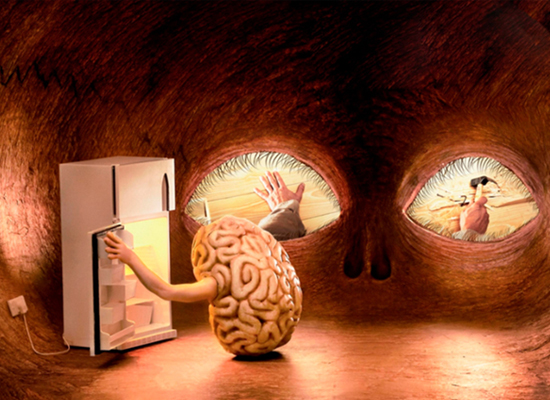
Disclaimer: Medical articles and academic information provided on this site are for educational purposes only and are not intended to diagnose, treat, or prevent any disease or to replace the advice of a physician. In addition, when the effects for a specific period, comparisons before and after product use, reviews of use, and end-of-life test results are specified, there may be different results for each user.
The Mechanism of Hydrogen in Resolving Brain Fatigue
-
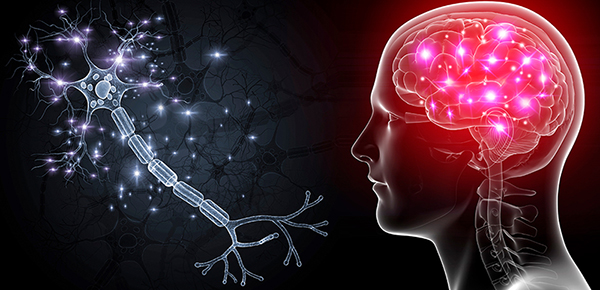
-
ROS in the brain causes an imbalance in the autonomic nervous system and damages the brain cells.
Molecular hydrogen reaches to the brain blood vessels
Since human cells contain many lipids and are covered with cell membranes, substances such as Vitamin C and some polyphenols hard to dissolve
in fat are not absorbed into the cells, so they are challenging to act on ROS generated in the cells directly. In particular,
these substances flow through the blood vessels through the digestive tract and get absorbed, but they cannot pass through cerebrovascular barriers
and are useless to the brain. Therefore, molecular hydrogen inhalation therapy has emerged as a solution to this problem. Hydrogen is the lightest
and smallest element composed of one proton and an electron. Molecular hydrogen (H2) exists as two hydrogen elements combined and as a gas.The hydrogen molecule is small and can combine with distinct elements to form a variety of substances. Amino acids, fatty acids, and sugars are also made by combining hydrogen with carbon and nitrogen.
-
Hydrogen Inhalation Experiment for Brain Fatigue at Tsukuba University
Hydrogen inhalation stimulates the cerebrum.
In December 2016, in the research's result conducted by Professor Yukihiro Yada on “autonomous nerve activity,” “brain stress” and “changes in the blood flow in the frontal lobe” (verified by the psychophysiological evaluation method after inhaling hydrogen, n=17 in the 20s and 30s women, it showed a significant result mainly in the changes in blood flow in the brain). The results were tested through fMRI and NIRS; National Radiological Research Institute of Japan examination of the blood flow change displayed that the brain's activity activated and changed its state through hydrogen inhalation to “relaxed mind and body,” allowing much keen concentration.
The Relaxation Effect of Parasympathetic Activity
(아래 표는 츠쿠바 대학원 야다 교수 연구 논문 내용)
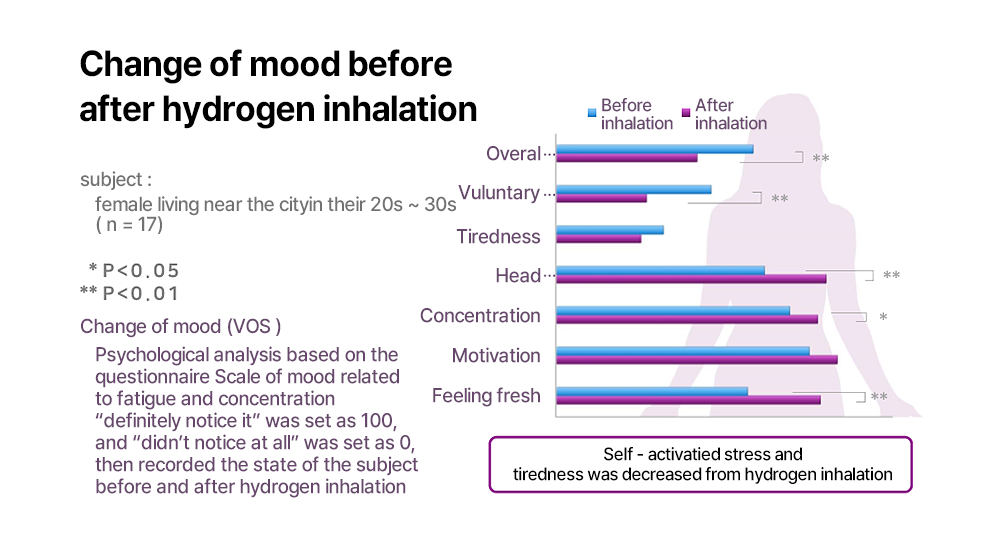
Skin Temperature: Increase in Temperature of the Fingertips Through Hydrogen Inhalation.
Stress Causes the Blood Not to Reach the Fingertips
When a sympathetic nerve is activated, blood does not flow to fingertips and toes because blood is usually concentrated in major muscles, heart, and eyes. Therefore, the heart races, digestion is troubled, and the stomach/hand/feet get cold when the body tenses up. Through measuring the fingertip temperature, Dr. Yada confirmed that skin temperature increased about 3℃ after hydrogen inhalation. Fingertip/toe temperature is a major barometer that shows tension and relaxation (sympathetic nerve activation). It proved that molecular hydrogen inhalation could suppress the sympathetic nerve and activate the parasympathetic nerve quickly and safely.
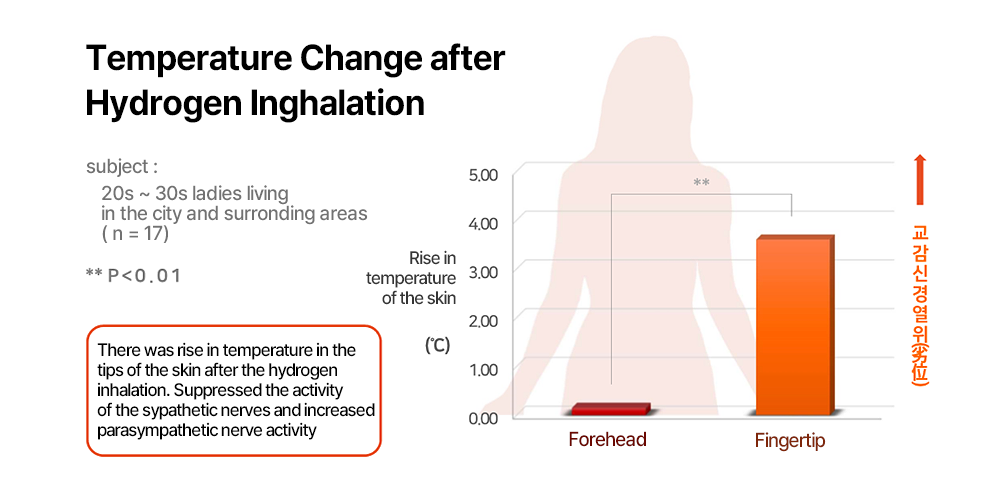
In this experiment, the subjects’ fingertip temperature increased by an average of 1℃, and there was a case where the temperature had risen to 3℃. Generally, various methods such as sauna and heating therapy had been used to increase the body temperature.
Disclaimer: Medical articles and academic information provided on this site are for educational purposes only and are not intended to diagnose, treat, or prevent any disease or to replace the advice of a physician. In addition, when the effects for a specific period, comparisons before and after product use, reviews of use, and end-of-life test results are specified, there may be different results for each user.
-
Product
-
Medical engineering
research -
Information
search -
References
-
Hue Light Site
-
Immune Care
Center -
Hue Light USA


